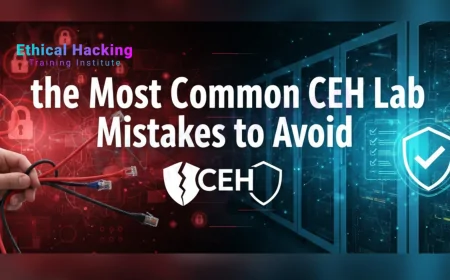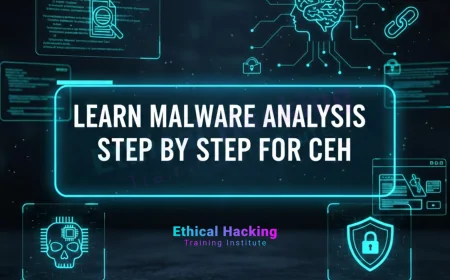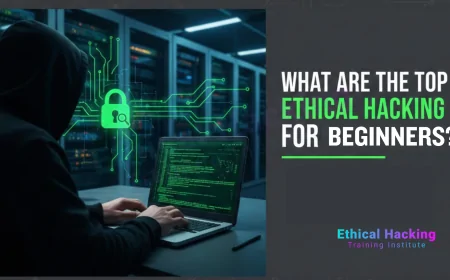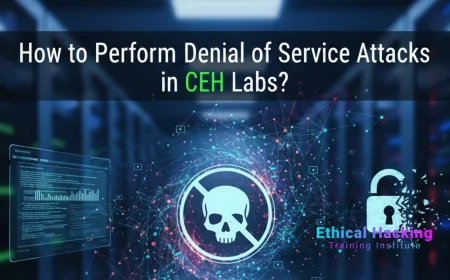Forensic Hacking Course: Learn How to Investigate Cybercrimes and Secure Systems | Cyber Forensics Course: Master the Skills to Track Hackers and Protect Digital Assets
Enroll in a forensic hacking course to master cybercrime investigation, digital forensics, and system security. Learn tools, skills, certifications, and career paths in forensic cybersecurity.
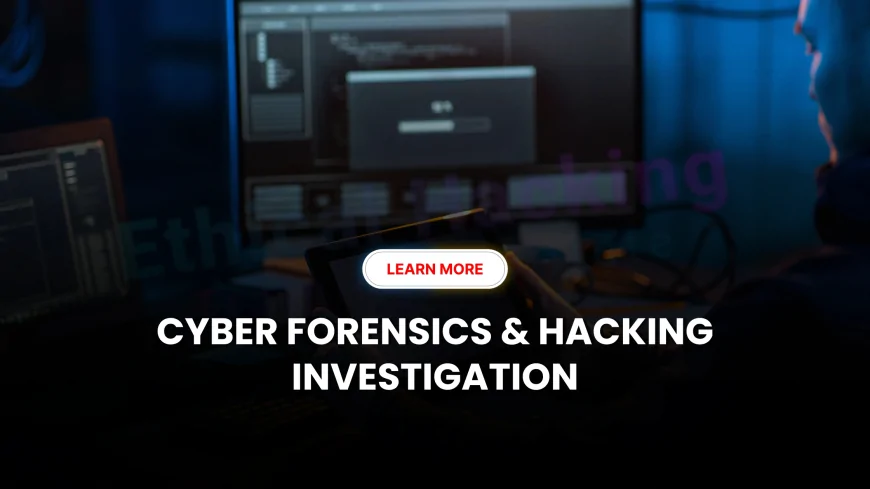
Table of Contents
- Introduction
- What Is Forensic Hacking?
- Why Forensic Hacking Matters Today
- Who Should Take a Forensic Hacking Course?
- Skills You Will Learn
- Common Course Modules
- Popular Tools Covered in the Course
- Online vs Offline Forensic Hacking Courses
- Top Forensic Hacking Course Providers
- Career Paths After Completing a Forensic Hacking Course
- Relevant Certifications in Forensic Hacking
- Job Market & Salary Outlook
- Real-World Case Studies in Forensic Hacking
- Legal Frameworks You Need to Know
- Benefits of Enrolling in a Forensic Hacking Course
- Tips to Succeed in Your Training
- Industry Recognition & Support
- Future Trends in Forensic Hacking
- Common Mistakes to Avoid
- Frequently Asked Questions (FAQs)
- Conclusion
Introduction
The digital age has brought convenience—but also unprecedented cybersecurity threats. Cyberattacks, data breaches, and digital fraud require more than just prevention; they demand skilled investigators. A Forensic Hacking Course equips you with both offensive and investigative skills to trace, analyze, and respond to cybercrime effectively.
What Is Forensic Hacking?
Forensic hacking is a cybersecurity discipline that combines ethical hacking techniques with digital forensics. The goal is to trace the root of cyberattacks, recover digital evidence, and prepare it for legal proceedings. It bridges the gap between hacking and investigation.
Why Forensic Hacking Matters Today
-
Cybercrime is a $10+ trillion threat globally.
-
Data breaches affect millions annually.
-
Legal and regulatory frameworks (GDPR, HIPAA) demand digital accountability.
-
Incident response requires skilled professionals to contain and investigate breaches.
Who Should Take a Forensic Hacking Course?
-
Aspiring cybersecurity analysts
-
IT professionals transitioning into cyber forensics
-
Ethical hackers seeking investigative skills
-
Law enforcement and legal professionals
-
Computer science and cybersecurity students
Skills You Will Learn
-
Network and system forensics
-
Malware analysis
-
Log file examination
-
Chain-of-custody handling
-
Evidence recovery and reporting
-
Reverse engineering
-
Mobile and cloud forensics
Common Course Modules
-
Introduction to Cybercrime & Digital Forensics
-
Operating System & File System Forensics
-
Email, Browser, and Social Media Forensics
-
Network Intrusion Detection & Analysis
-
Malware Forensics
-
Mobile Device Forensics
-
Cloud & IoT Forensics
-
Legal & Ethical Aspects of Forensic Hacking
Popular Tools Covered in the Course
-
EnCase
-
Autopsy
-
FTK (Forensic Toolkit)
-
Wireshark
-
Volatility
-
Sleuth Kit
-
Cellebrite
-
X-Ways
-
Metasploit & Kali Linux for penetration testing
Online vs Offline Forensic Hacking Courses
| Feature | Online Mode | Offline Mode |
|---|---|---|
| Flexibility | High | Low |
| Hands-on Labs | Virtual | Physical |
| Instructor Access | Live/Recorded | Direct |
| Cost | Affordable | Expensive |
| Certification Support | Available | Available |
Choose based on your schedule, budget, and preferred learning style.
Top Forensic Hacking Course Providers
-
WebAsha Technologies provides experiential learning through its dedicated cyber labs.
Career Paths After Completing a Forensic Hacking Course
-
Digital Forensics Analyst
-
Cybercrime Investigator
-
Security Operations Center (SOC) Analyst
-
Incident Responder
-
Malware Analyst
-
Cybersecurity Consultant
-
Legal Technology Specialist
Relevant Certifications in Forensic Hacking
-
CHFI (EC-Council)
-
GCFA (GIAC Certified Forensic Analyst)
-
CISA (ISACA)
-
CISSP (ISC2)
-
CCE (Certified Computer Examiner)
Job Market & Salary Outlook
| Country | Avg. Salary (USD) |
|---|---|
| USA | $95,000–$140,000 |
| UK | £50,000–£90,000 |
| India | ₹10–25 LPA |
| Australia | AU$95,000+ |
Organizations in the government, defense, financial, and technology sectors consistently hire certified cyber forensic professionals.
Real-World Case Studies in Forensic Hacking
-
Ransomware Recovery: Traced encrypted payload and restored systems from forensic backups.
-
Insider Threat Investigation: Proved data theft using email and file access logs.
-
Cloud Breach: Analyzed audit trails to identify compromised credentials and entry points.
Legal Frameworks You Need to Know
-
GDPR (EU)
-
HIPAA (USA)
-
CCPA (California)
-
IT Act (India)
-
Chain of Custody Protocols
-
Evidence Admissibility Rules
Forensic hackers must preserve, document, and present digital evidence lawfully.
Benefits of Enrolling in a Forensic Hacking Course
-
Gain practical, job-ready skills
-
Validate your expertise with certification
-
Open doors to specialized job roles
-
Increase your salary potential
-
Follow industry news to stay aligned with breach statistics and legal updates.
-
Build credibility in court-admissible investigations
Tips to Succeed in Your Training
-
Set a structured learning schedule
-
Practice using real forensic tools
-
Join online communities and forums
-
Take mock exams and quizzes
-
Work on simulated case studies
-
Stay updated with cyber laws and breach trends
Industry Recognition & Support
Top employers support forensic training:
-
Deloitte
-
EY (Ernst & Young)
-
IBM Security
-
PwC
-
Accenture
-
Cisco
-
Government law enforcement and military agencies
Future Trends in Forensic Hacking
-
AI-assisted forensic analysis
-
Cloud-native investigation platforms
-
Digital identity forensics
-
Blockchain evidence tracking
-
Forensics-as-a-Service (FaaS)
Common Mistakes to Avoid
-
Ignoring legal procedures during evidence handling
-
Relying only on automated tools
-
Failing to document findings properly
-
Skipping hands-on labs
-
Not practicing report writing or courtroom delivery
Frequently Asked Questions (FAQs)
1. What is forensic hacking?
It is the practice of investigating cybercrimes using ethical hacking and forensic techniques to uncover digital evidence.
2. Who can enroll in a forensic hacking course?
IT professionals, students, law enforcement agents, and anyone interested in cybersecurity can join.
3. What are the prerequisites?
Basic understanding of networks, operating systems, and security concepts is helpful but not mandatory.
4. Is the course available online?
Yes, many training providers offer full online modules with virtual labs.
5. How long does the course take?
From 1 week (bootcamp) to 6 months, depending on course depth and pace.
6. What certification can I get?
Popular certifications include CHFI, GCFA, and CCE.
7. Are tools like EnCase and FTK taught?
Yes, most comprehensive courses include popular forensic tool training.
8. What are the job prospects?
Excellent—cybercrime investigation roles are growing globally across sectors.
9. Can this course help me work in law enforcement?
Yes—especially when paired with certifications and legal knowledge.
10. What is the average salary after this course?
Between $80,000 and $130,000 depending on region and experience.
11. Will I be able to handle real-world incidents?
Courses with labs and case studies will prepare you for practical scenarios.
12. Are there legal modules included?
Yes—compliance, chain of custody, and evidence handling are covered.
13. Can I specialize after this?
Yes—mobile, cloud, and malware forensics are specialty areas you can pursue.
14. How do I practice forensic techniques?
Virtual labs, home labs, and capture-the-flag (CTF) events help build skills.
15. Will I get job assistance?
Some providers offer placement help or resume reviews.
16. What if I’m not from a tech background?
Foundational courses are beginner-friendly with structured learning paths.
17. What makes a good forensic investigator?
Attention to detail, critical thinking, technical knowledge, and legal awareness.
18. What’s the difference between ethical hacking and forensic hacking?
Ethical hacking is preventive; forensic hacking is investigative after a breach.
19. Is the certification globally accepted?
Yes—certifications like CHFI and GCFA are recognized worldwide.
20. How do I start?
Choose a reputable course provider, set a study schedule, and begin hands-on learning.
Conclusion
A Forensic Hacking Course is more than a technical training—it's a career accelerator for professionals aiming to combat cybercrime. Whether you’re an IT pro, an ethical hacker, or an aspiring investigator, this course offers a powerful skillset in high demand. With the right provider and consistent effort, you can become an indispensable part of cybersecurity defense and investigation.
What's Your Reaction?
 Like
0
Like
0
 Dislike
0
Dislike
0
 Love
0
Love
0
 Funny
0
Funny
0
 Angry
0
Angry
0
 Sad
0
Sad
0
 Wow
0
Wow
0






